|
MySQL 5.6.14 Source Code Document
|
|
MySQL 5.6.14 Source Code Document
|
Represents a transaction. More...
#include <NdbTransaction.hpp>
Public Types | |
| enum | ExecType { NoExecTypeDef, Prepare = ::Prepare, NoCommit, Commit, Rollback = ::Rollback } |
Public Member Functions | |
| Ndb * | getNdb () |
| NdbOperation * | getNdbOperation (const char *aTableName) |
| NdbOperation * | getNdbOperation (const NdbDictionary::Table *aTable) |
| NdbScanOperation * | getNdbScanOperation (const char *aTableName) |
| NdbScanOperation * | getNdbScanOperation (const NdbDictionary::Table *aTable) |
| NdbIndexScanOperation * | getNdbIndexScanOperation (const char *anIndexName, const char *aTableName) |
| NdbIndexScanOperation * | getNdbIndexScanOperation (const NdbDictionary::Index *anIndex, const NdbDictionary::Table *aTable) |
| NdbIndexScanOperation * | getNdbIndexScanOperation (const NdbDictionary::Index *anIndex) |
| NdbIndexOperation * | getNdbIndexOperation (const char *anIndexName, const char *aTableName) |
| NdbIndexOperation * | getNdbIndexOperation (const NdbDictionary::Index *anIndex, const NdbDictionary::Table *aTable) |
| NdbIndexOperation * | getNdbIndexOperation (const NdbDictionary::Index *anIndex) |
| int | executePendingBlobOps (Uint8 flags=0xFF) |
| Uint32 | getConnectedNodeId () |
| const NdbOperation * | readTuple (const NdbRecord *key_rec, const char *key_row, const NdbRecord *result_rec, char *result_row, NdbOperation::LockMode lock_mode=NdbOperation::LM_Read, const unsigned char *result_mask=0, const NdbOperation::OperationOptions *opts=0, Uint32 sizeOfOptions=0) |
| const NdbOperation * | insertTuple (const NdbRecord *key_rec, const char *key_row, const NdbRecord *attr_rec, const char *attr_row, const unsigned char *mask=0, const NdbOperation::OperationOptions *opts=0, Uint32 sizeOfOptions=0) |
| const NdbOperation * | insertTuple (const NdbRecord *combined_rec, const char *combined_row, const unsigned char *mask=0, const NdbOperation::OperationOptions *opts=0, Uint32 sizeOfOptions=0) |
| const NdbOperation * | updateTuple (const NdbRecord *key_rec, const char *key_row, const NdbRecord *attr_rec, const char *attr_row, const unsigned char *mask=0, const NdbOperation::OperationOptions *opts=0, Uint32 sizeOfOptions=0) |
| const NdbOperation * | writeTuple (const NdbRecord *key_rec, const char *key_row, const NdbRecord *attr_rec, const char *attr_row, const unsigned char *mask=0, const NdbOperation::OperationOptions *opts=0, Uint32 sizeOfOptions=0) |
| const NdbOperation * | deleteTuple (const NdbRecord *key_rec, const char *key_row, const NdbRecord *result_rec, char *result_row=0, const unsigned char *result_mask=0, const NdbOperation::OperationOptions *opts=0, Uint32 sizeOfOptions=0) |
| const NdbOperation * | refreshTuple (const NdbRecord *key_rec, const char *key_row, const NdbOperation::OperationOptions *opts=0, Uint32 sizeOfOptions=0) |
| NdbScanOperation * | scanTable (const NdbRecord *result_record, NdbOperation::LockMode lock_mode=NdbOperation::LM_Read, const unsigned char *result_mask=0, const NdbScanOperation::ScanOptions *options=0, Uint32 sizeOfOptions=0) |
| NdbIndexScanOperation * | scanIndex (const NdbRecord *key_record, const NdbRecord *result_record, NdbOperation::LockMode lock_mode=NdbOperation::LM_Read, const unsigned char *result_mask=0, const NdbIndexScanOperation::IndexBound *bound=0, const NdbScanOperation::ScanOptions *options=0, Uint32 sizeOfOptions=0) |
| NdbQuery * | createQuery (const NdbQueryDef *query, const NdbQueryParamValue paramValue[]=0, NdbOperation::LockMode lock_mode=NdbOperation::LM_Read) |
| const NdbOperation * | unlock (const NdbLockHandle *lockHandle, NdbOperation::AbortOption ao=NdbOperation::DefaultAbortOption) |
| int | releaseLockHandle (const NdbLockHandle *lockHandle) |
| Uint32 | getMaxPendingBlobReadBytes () const |
| Uint32 | getMaxPendingBlobWriteBytes () const |
| void | setMaxPendingBlobReadBytes (Uint32 bytes) |
| void | setMaxPendingBlobWriteBytes (Uint32 bytes) |
Execute Transaction | |
| int | execute (ExecType execType, NdbOperation::AbortOption=NdbOperation::DefaultAbortOption, int force=0) |
| int | execute (::ExecType execType,::AbortOption abortOption=::DefaultAbortOption, int force=0) |
| void | executeAsynchPrepare (ExecType execType, NdbAsynchCallback callback, void *anyObject, NdbOperation::AbortOption=NdbOperation::DefaultAbortOption) |
| void | executeAsynchPrepare (::ExecType execType, NdbAsynchCallback callback, void *anyObject,::AbortOption ao=::DefaultAbortOption) |
| void | executeAsynch (ExecType aTypeOfExec, NdbAsynchCallback aCallback, void *anyObject, NdbOperation::AbortOption=NdbOperation::DefaultAbortOption, int forceSend=0) |
| void | executeAsynch (::ExecType aTypeOfExec, NdbAsynchCallback aCallback, void *anyObject,::AbortOption abortOption=::DefaultAbortOption, int forceSend=0) |
| int | refresh () |
| void | close () |
| int | restart () |
Error Handling | |
| const NdbError & | getNdbError () const |
| NdbOperation * | getNdbErrorOperation () |
| const NdbOperation * | getNdbErrorOperation () const |
| int | getNdbErrorLine () |
| const NdbOperation * | getNextCompletedOperation (const NdbOperation *op) const |
| const NdbOperation * | getFirstDefinedOperation () const |
| const NdbOperation * | getLastDefinedOperation () const |
Friends | |
| class | Ndb |
| class | NdbOperation |
| class | NdbScanOperation |
| class | NdbIndexOperation |
| class | NdbIndexScanOperation |
| class | NdbBlob |
| class | ha_ndbcluster |
| class | NdbQueryImpl |
| class | NdbQueryOperationImpl |
| class | HugoOperations |
| struct | Ndb_free_list_t< NdbTransaction > |
Meta Information | |
| enum | CommitStatusType { NotStarted, Started, Committed, Aborted, NeedAbort } |
| int | getGCI (Uint64 *gciptr) |
| int | getGCI () |
| Uint64 | getTransactionId () |
| CommitStatusType | commitStatus () |
Represents a transaction.
A transaction (represented by an NdbTransaction object) belongs to an Ndb object and is created using Ndb::startTransaction(). A transaction consists of a list of operations (represented by NdbOperation, NdbScanOperation, NdbIndexOperation, and NdbIndexScanOperation objects). Each operation access exactly one table.
After getting the NdbTransaction object, the first step is to get (allocate) an operation given the table name using one of the methods getNdbOperation(), getNdbScanOperation(), getNdbIndexOperation(), or getNdbIndexScanOperation(). Then the operation is defined. Several operations can be defined on the same NdbTransaction object, they will in that case be executed in parallell. When all operations are defined, the execute() method sends them to the NDB kernel for execution.
The execute() method returns when the NDB kernel has completed execution of all operations defined before the call to execute(). All allocated operations should be properly defined before calling execute().
A call to execute() uses one out of three types of execution:
execute() is equipped with an extra error handling parameter. There are two alternatives:
Definition at line 145 of file NdbTransaction.hpp.
The commit status of the transaction.
| NotStarted |
Transaction not yet started. |
| Started |
Missing explanation |
| Committed |
Transaction has been committed. |
| Aborted |
Transaction has been aborted. |
| NeedAbort |
Missing explanation |
Definition at line 573 of file NdbTransaction.hpp.
Execution type of transaction
Definition at line 175 of file NdbTransaction.hpp.
| void NdbTransaction::close | ( | void | ) |
Close transaction
Definition at line 961 of file NdbTransaction.cpp.

| NdbTransaction::CommitStatusType NdbTransaction::commitStatus | ( | ) |
Get the commit status of the transaction.
Definition at line 2411 of file NdbTransaction.cpp.
| NdbQuery * NdbTransaction::createQuery | ( | const NdbQueryDef * | query, |
| const NdbQueryParamValue | paramValue[] = 0, |
||
| NdbOperation::LockMode | lock_mode = NdbOperation::LM_Read |
||
| ) |
Add a prepared NdbQueryDef to transaction for execution.
If the NdbQueryDef contains parameters, (built with NdbQueryBilder::paramValue()) the value of these parameters are specified in the 'paramValue' array. Parameter values Should be supplied in the same order as the related paramValue's was defined.
Definition at line 3030 of file NdbTransaction.cpp.

| int NdbTransaction::execute | ( | ExecType | execType, |
| NdbOperation::AbortOption | abortOption = NdbOperation::DefaultAbortOption, |
||
| int | force = 0 |
||
| ) |
Executes transaction.
| execType | Execution type: ExecType::NoCommit executes operations without committing them. ExecType::Commit executes remaining operations and commits the complete transaction. ExecType::Rollback rollbacks the entire transaction. |
| abortOption | Handling of error while excuting AbortOnError - Abort transaction if an operation fail AO_IgnoreError - Accept failing operations DefaultAbortOption - Use per-operation abort option |
| force | When operations should be sent to NDB Kernel. (See Adaptive Send Algorithm.)
|
We abort the execute here. But we still need to put the split-off operation list back into the transaction object, or we will get a memory leak.
Definition at line 289 of file NdbTransaction.cpp.
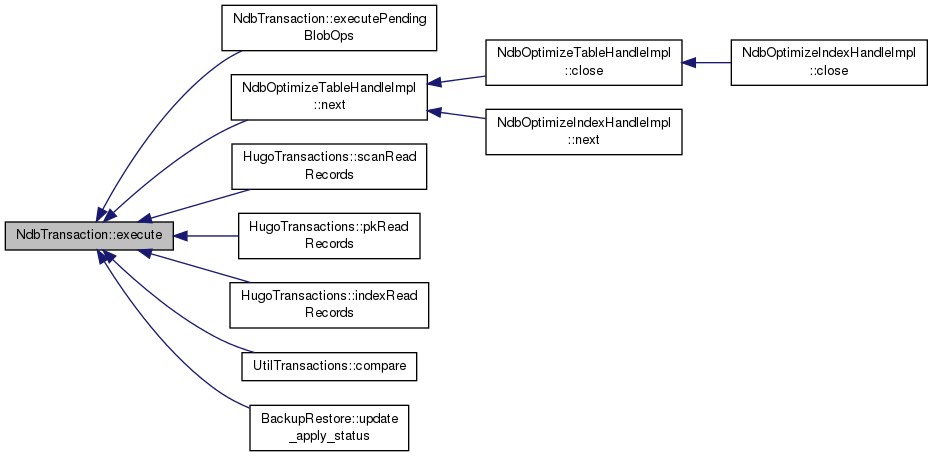
| void NdbTransaction::executeAsynch | ( | ExecType | aTypeOfExec, |
| NdbAsynchCallback | aCallback, | ||
| void * | anyObject, | ||
| NdbOperation::AbortOption | abortOption = NdbOperation::DefaultAbortOption, |
||
| int | forceSend = 0 |
||
| ) |
Prepare and send an asynchronous transaction.
This method perform the same action as NdbTransaction::executeAsynchPrepare but also sends the operations to the NDB kernel.
See NdbTransaction::executeAsynchPrepare for information about the parameters of this method.
See Asynchronous Transactions for more information on how to use this method.
Definition at line 951 of file NdbTransaction.cpp.
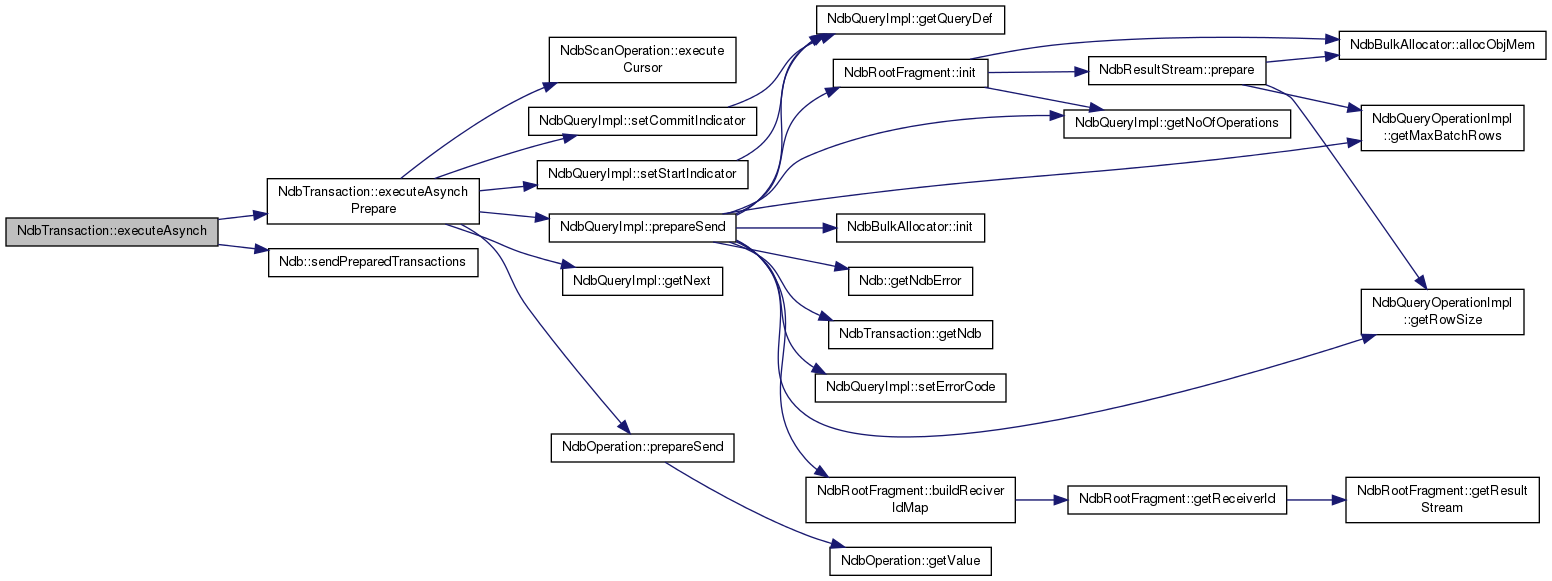
| void NdbTransaction::executeAsynchPrepare | ( | NdbTransaction::ExecType | aTypeOfExec, |
| NdbAsynchCallback | callback, | ||
| void * | anyObject, | ||
| NdbOperation::AbortOption | abortOption = NdbOperation::DefaultAbortOption |
||
| ) |
Prepare an asynchronous transaction.
See Asynchronous Transactions for more information on how to use this method.
| execType | Execution type: ExecType::NoCommit executes operations without committing them. ExecType::Commit executes remaining operations and commits the complete transaction. ExecType::Rollback rollbacks the entire transaction. |
| callback | A callback method. This method gets called when the transaction has been executed. See ndbapi_async1.cpp for an example on how to specify and use a callback method. |
| anyObject | A void pointer. This pointer is forwarded to the callback method and can be used to give the callback method some data to work on. It is up to the application programmer to decide on the use of this pointer. |
| abortOption | see execute |
Reset error.code on execute
for timeout (4012) we want sendROLLBACK to behave differently. Else, normal behaviour of reset errcode
Definition at line 689 of file NdbTransaction.cpp.
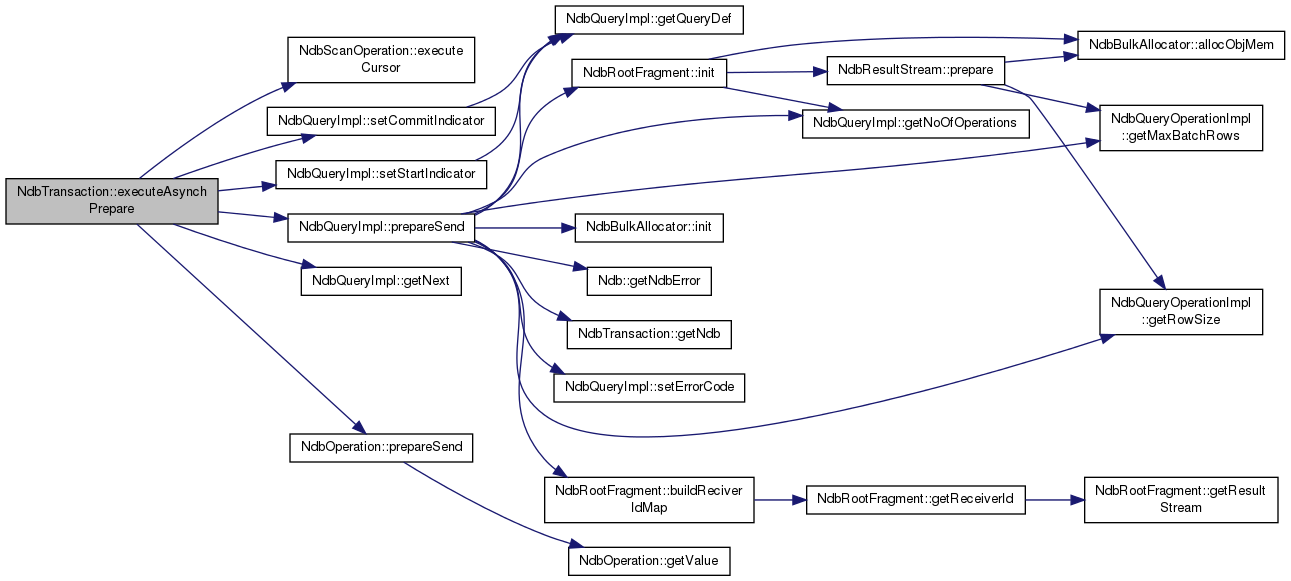

|
inline |
Execute the transaction in NoCommit mode if there are any not-yet executed blob part operations of given types. Otherwise do nothing. The flags argument is bitwise OR of (1 << optype) where optype comes from NdbOperation::OperationType. Only the basic PK ops are used (read, insert, update, delete).
Definition at line 1432 of file NdbTransaction.hpp.

|
inline |
Get nodeId of TC for this transaction
Definition at line 1293 of file NdbTransaction.hpp.
| int NdbTransaction::getGCI | ( | Uint64 * | gciptr | ) |
Get global checkpoint identity (GCI) of transaction.
Each committed transaction belong to a GCI. The log for the committed transaction is saved on disk when a global checkpoint occurs.
Whether or not the global checkpoint with this GCI has been saved on disk or not cannot be determined by this method.
By comparing the GCI of a transaction with the value last GCI restored in a restarted NDB Cluster one can determine whether the transaction was restored or not.
Definition at line 2386 of file NdbTransaction.cpp.
| int NdbTransaction::getGCI | ( | ) |
Deprecated...in favor of getGCI(Uint64*)
Definition at line 2375 of file NdbTransaction.cpp.
|
inline |
Convenience method to fetch this transaction's Ndb* object
Definition at line 200 of file NdbTransaction.hpp.

| const NdbError & NdbTransaction::getNdbError | ( | ) | const |
Get error object with information about the latest error.
Definition at line 52 of file Ndberr.cpp.
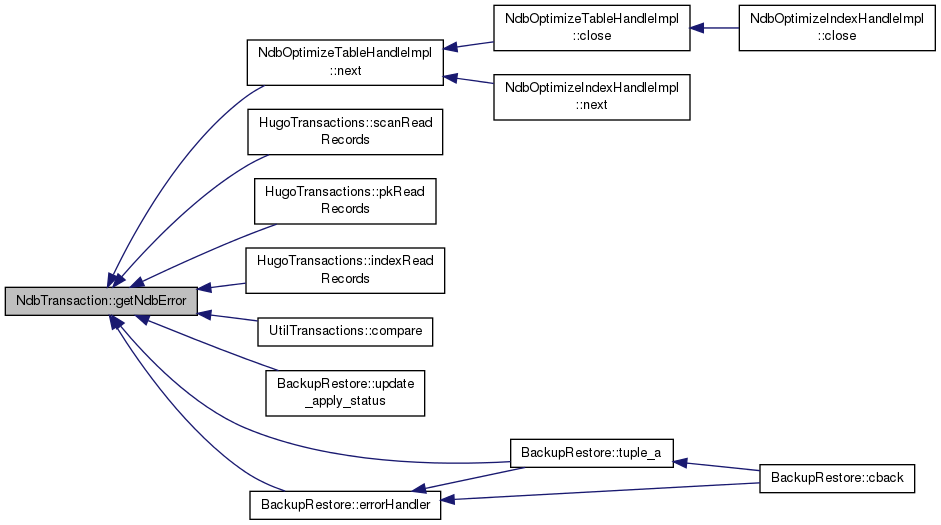
| int NdbTransaction::getNdbErrorLine | ( | ) |
Get the method number where the latest error occured.
Definition at line 2417 of file NdbTransaction.cpp.
| NdbOperation * NdbTransaction::getNdbErrorOperation | ( | ) |
Get the latest NdbOperation which had an error. This method is used on the NdbTransaction object to find the NdbOperation causing an error. To find more information about the actual error, use method NdbOperation::getNdbError() on the returned NdbOperation object.
Definition at line 2423 of file NdbTransaction.cpp.
| const NdbOperation * NdbTransaction::getNdbErrorOperation | ( | ) | const |
Get the latest NdbOperation which had an error. This method is used on the NdbTransaction object to find the NdbOperation causing an error. To find more information about the actual error, use method NdbOperation::getNdbError() on the returned NdbOperation object.
Definition at line 2430 of file NdbTransaction.cpp.
| NdbIndexOperation * NdbTransaction::getNdbIndexOperation | ( | const char * | anIndexName, |
| const char * | aTableName | ||
| ) |
Get an operation from NdbIndexOperation idlelist and get the NdbTransaction object that was fetched by startTransaction pointing to this operation.
| anIndexName | The index name (as created by createIndex). |
| aTableName | The table name. |
Definition at line 1729 of file NdbTransaction.cpp.
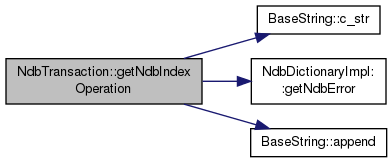

| NdbIndexOperation * NdbTransaction::getNdbIndexOperation | ( | const NdbDictionary::Index * | anIndex | ) |
Get an operation from NdbIndexOperation idlelist and get the NdbTransaction object that was fetched by startTransaction pointing to this operation.
| anIndex | An index object (fetched by NdbDictionary::Dictionary::getIndex). |
Definition at line 1827 of file NdbTransaction.cpp.
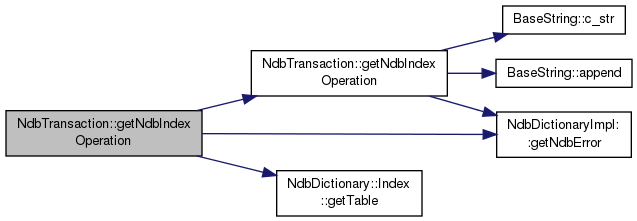
| NdbIndexScanOperation * NdbTransaction::getNdbIndexScanOperation | ( | const char * | anIndexName, |
| const char * | aTableName | ||
| ) |
Get an operation from NdbIndexScanOperation idlelist and get the NdbTransaction object which was fetched by startTransaction pointing to this operation.
| anIndexName | The name of the index to use for scanning |
| aTableName | The name of the table to scan |
Definition at line 1571 of file NdbTransaction.cpp.

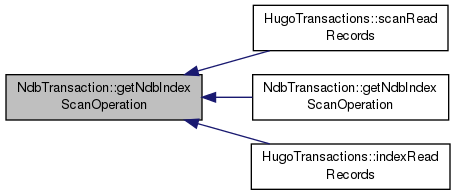
| NdbIndexScanOperation * NdbTransaction::getNdbIndexScanOperation | ( | const NdbDictionary::Index * | anIndex | ) |
Get an operation from NdbIndexScanOperation idlelist and get the NdbTransaction object which was fetched by startTransaction pointing to this operation.
| anIndex | An index object (fetched by NdbDictionary::Dictionary::getIndex). |
Definition at line 1617 of file NdbTransaction.cpp.

| NdbOperation * NdbTransaction::getNdbOperation | ( | const char * | aTableName | ) |
Get an NdbOperation for a table. Note that the operation has to be defined before it is executed.
| aTableName | The table name. |
Definition at line 1442 of file NdbTransaction.cpp.


| NdbOperation * NdbTransaction::getNdbOperation | ( | const NdbDictionary::Table * | aTable | ) |
Get an NdbOperation for a table. Note that the operation has to be defined before it is executed.
| aTable | A table object (fetched by NdbDictionary::Dictionary::getTable) |
Definition at line 1522 of file NdbTransaction.cpp.

| NdbScanOperation * NdbTransaction::getNdbScanOperation | ( | const char * | aTableName | ) |
Get an operation from NdbScanOperation idlelist and get the NdbTransaction object which was fetched by startTransaction pointing to this operation.
| aTableName | The table name. |
Definition at line 1543 of file NdbTransaction.cpp.
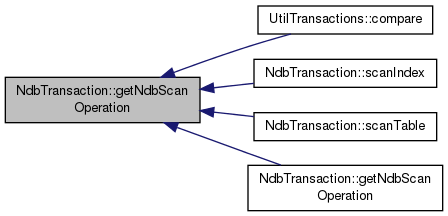
| NdbScanOperation * NdbTransaction::getNdbScanOperation | ( | const NdbDictionary::Table * | aTable | ) |
Get an operation from NdbScanOperation idlelist and get the NdbTransaction object which was fetched by startTransaction pointing to this operation.
| aTable | A table object (fetched by NdbDictionary::Dictionary::getTable) |
Definition at line 1706 of file NdbTransaction.cpp.

| const NdbOperation * NdbTransaction::getNextCompletedOperation | ( | const NdbOperation * | op | ) | const |
Get completed (i.e. executed) operations of a transaction
This method should only be used after a transaction has been executed.
This method is typically used to fetch all NdbOperation:s of a transaction to check for errors (use NdbOperation::getNdbError to fetch the NdbError object of an NdbOperation).
| op | Operation, NULL means get first operation |
Definition at line 2437 of file NdbTransaction.cpp.
| Uint64 NdbTransaction::getTransactionId | ( | ) |
Get transaction identity.
Definition at line 2405 of file NdbTransaction.cpp.
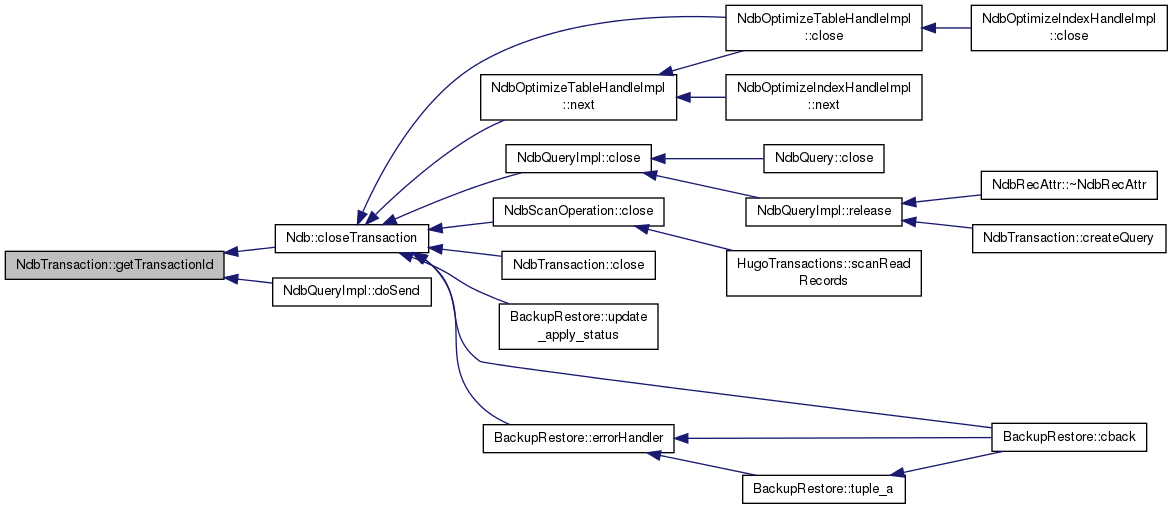
| int NdbTransaction::refresh | ( | ) |
Refresh Update timeout counter of this transaction in the database. If you want to keep the transaction active in the database longer than the transaction abort timeout.
Definition at line 966 of file NdbTransaction.cpp.
| int NdbTransaction::restart | ( | ) |
Restart transaction
Once a transaction has been completed successfully it can be started again wo/ calling closeTransaction/startTransaction
Definition at line 236 of file NdbTransaction.cpp.

| NdbIndexScanOperation * NdbTransaction::scanIndex | ( | const NdbRecord * | key_record, |
| const NdbRecord * | result_record, | ||
| NdbOperation::LockMode | lock_mode = NdbOperation::LM_Read, |
||
| const unsigned char * | result_mask = 0, |
||
| const NdbIndexScanOperation::IndexBound * | bound = 0, |
||
| const NdbScanOperation::ScanOptions * | options = 0, |
||
| Uint32 | sizeOfOptions = 0 |
||
| ) |
Do an index range scan (optionally ordered) of a table.
The key_record describes the index to be scanned. It must be a key record for the index, ie. it must specify (at least) all the key columns of the index. And it must be created from the index to be scanned (not from the underlying table).
The result_record describes the rows to be returned from the scan. For an ordered index scan, result_record must be a key record for the index to be scanned, that is it must include at least all of the columns in the index (the reason is that the full index key is needed by NDBAPI for merge sorting the ordered rows returned from each fragment). The result_record must be created from the underlying table, not from the index to be scanned.
Both the key_record and result_record NdbRecord structures must stay in-place until the scan operation is closed.
A single IndexBound can either be specified in this call or in a separate call to NdbIndexScanOperation::setBound(). To perform a multi range read, the scan_flags in the ScanOptions structure must include SF_MULTIRANGE. Additional bounds can then be added using multiple calls to NdbIndexScanOperation::setBound().
To specify an equals bound, use the same row pointer for the low_key and high_key with the low and high inclusive bits set.
A ScanOptions structure can be passed, specifying extra options. See the definition of the ScanOptions structure for more information.
To enable backwards compatability of this interface, a sizeOfOptions parameter can be passed. This parameter indicates the size of the ScanOptions structure at the time the client was compiled, and enables detection of the use of an old ScanOptions structure. If this functionality is not required, it can be left set to zero.
Definition at line 2844 of file NdbTransaction.cpp.

| NdbScanOperation * NdbTransaction::scanTable | ( | const NdbRecord * | result_record, |
| NdbOperation::LockMode | lock_mode = NdbOperation::LM_Read, |
||
| const unsigned char * | result_mask = 0, |
||
| const NdbScanOperation::ScanOptions * | options = 0, |
||
| Uint32 | sizeOfOptions = 0 |
||
| ) |
Scan a table, using NdbRecord to read out column data.
The NdbRecord pointed to by result_record must remain valid until the scan operation is closed.
The result_mask pointer is optional, if present only columns for which the corresponding bit (by attribute id order) in result_mask is set will be retrieved in the scan. The result_mask is copied internally, so in contrast to result_record need not be valid at execute().
A ScanOptions structure can be passed, specifying extra options. See the definition of the NdbScanOperation::ScanOptions structure for more information.
To enable backwards compatability of this interface, a sizeOfOptions parameter can be passed. This parameter indicates the size of the ScanOptions structure at the time the client was compiled, and enables detection of the use of an old ScanOptions structure. If this functionality is not required, it can be left set to zero.
Definition at line 2800 of file NdbTransaction.cpp.

|
friend |
Reciver(s)
Definition at line 148 of file NdbTransaction.hpp.
|
friend |
Sender(s)
Definition at line 151 of file NdbTransaction.hpp.
|
friend |
Sender(s)
Definition at line 149 of file NdbTransaction.hpp.